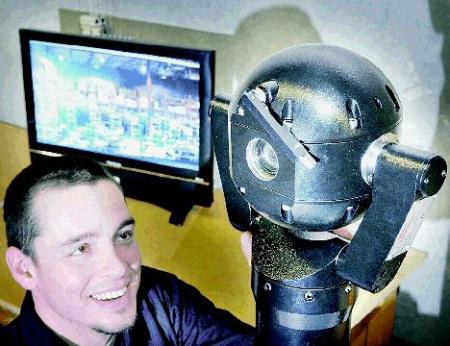B.C. companies protect infrastructure with high-tech equipment
Brian Morton
Sun

A new closed circuit video camera by Burnaby-based company, Extreme CCTV Inc., is approved for use in explosive and volatile environments to protect critical Canadian infrastructure. Photograph by : Ian Lindsay, Vancouver Sun
Global concerns about terrorist attacks on critical infrastructure facilities are creating new business for Vancouver-area companies.
Extreme CCTV Inc. of Burnaby has developed a moving surveillance camera that can record images in hazardous locations without causing any sparks or electric arcs that might trigger an explosion.
Locations such as oil refineries are frequently listed as potential terrorist targets and therefore prime users of surveillance equipment.
The new camera is installed inside a steel casing to help it withstand the pressure of a blast, whether it be from attacks or accidents.
“The primary reason for this is for protection against terrorist attacks,” Jack Gin, president and CEO of Extreme CCTV, said in an interview Wednesday of the company’s new Moondance Mic1-440, a pan-tilt-zoom camera.
“We need security at critical locations, like oil refineries, fuel handling [facilities], pipelines, places where they make nitrogen or chlorine,” Gin said.
The camera is important because it operates safely in highly flammable areas, he said. “In a hazardous environment, an ordinary camera could cause destruction by overheating, sparking and electrical arcing. There could be a surge in voltage. But this camera operates in a benign fashion. It’s designed so that there’s no way the equipment could ignite a fire. Even if something burned inside [the camera casing], there’s no flame path to the outside.”
Gin said Extreme CCTV has already sold several cameras to a U.S. arms manufacturer, whose name he wouldn’t disclose.
“We see a large market for this,” added Gin of the camera, which costs approximately $12,000. “This camera provides safe surveillance from a remote location. It’s a market that’s really growing because of the need for security in these areas. We’d be disappointed if it didn’t click in revenues in the millions of dollars.”
Meanwhile, North Vancouver-based OSI Geospatial Inc., which provides technology to help U.S. soldiers track their location, has hired the former head of the U.S. navy’s elite Anti-Terrorism/Force Protection Assessment Program to head a new U.S. business unit called Layered Security Solutions, which is designed to help protect U.S. infrastructure.
The new unit will be led by James Liddy, the former head of the U.S. navy’s elite Anti Terrorism/Force Protection Assessment Program and co-author of the book, Fight Back: Fighting Terrorism, Liddy Style.
Liddy said in a statement Wednesday that OSI Geospatial is “well positioned to offer unique technology solutions to the CIP [critical infrastructure protection] market, and I am confident that we will become a key solutions provider in the U.S. and internationally.”
The release stated that the critical infrastructure sectors include agriculture, banking and finance, chemical and hazardous materials, the defence industrial base, emergency services, energy, food, government, information technology and telecommunications, postal and shipping, public health and health care, transportation and drinking water, and water treatment systems.
Also, earlier this week, Richmond-based MacDonald, Dettwiler and Associates Ltd. announced that it has signed a one-year contract to help Canadian military forces uncover the supply chain for deadly roadside bombs and other explosive devices in Afghanistan.
The company’s information systems group vice-president, David Hargreaves, said MacDonald, Dettwiler and Associates will collect information from a variety of existing sources, including ground-based and airborne surveillance systems, and apply a geographic-profiling technique.
“By combining the information with the background on how the perpetrators operate, you can produce threat maps that give you a probability of where their factories and meeting points and organization points are likely to be,” he said.
The value of the contract with Defence Research and Development Canada was not disclosed.
© The Vancouver Sun 2007

